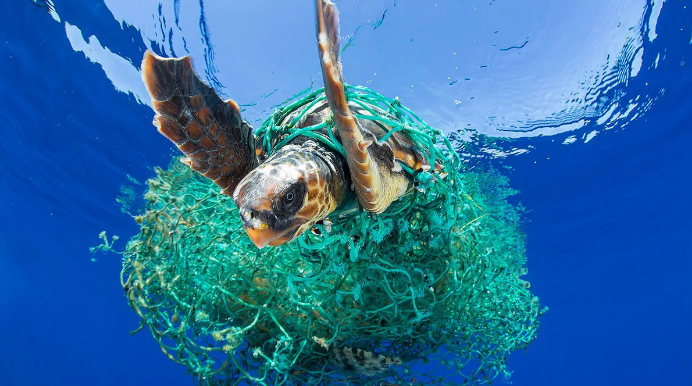
Plastic pollution is a serious problem for our oceans. Every year, about ten million tons of plastic waste enter the sea, spreading over several million square kilometers.
Plastic is dangerous for sea animals. Turtles, fish, and birds often eat plastic by mistake. This can block their stomachs or even kill them. Tiny plastic pieces called microplastics float in the ocean and might end up in our food.
But here’s some good news! Groups like The Ocean Cleanup are taking action. They have created solar-powered machines called Interceptors. These machines catch plastic in rivers before it reaches the ocean. One Interceptor can collect up to 50,000 kilograms of trash every day.
The same group also cleans plastic in the ocean. They use special floating nets in the Great Pacific Garbage Patch, which is bigger than France! The collected plastic turns into new products. Their goal is to clean up 90% of ocean plastic by 2040.
Governments are helping too. Many countries now recycle better and ban plastic bags/straws in cities. Companies are making reusable water bottles and shopping bags.
You can help too! Simple actions like using cloth bags and saying “no” to plastic straws matter. Your school might teach about sorting recyclable trash — this really helps!
Scientists say we can win this fight. By working together with new technology, we can protect our oceans. Remember — every plastic bottle you recycle helps save a fish!
原创编写 版权所有 侵权必究! 每日更新 个性化阅读 英语飙升!
1. 1. Why is plastic dangerous to sea turtles?
A It makes the water too dirty.
B They mistake it for food and eat it.
C It stops them from swimming.
D It changes their living habits.
2. 2. What is the main function of “Interceptors”?
A To quickly recycle plastic in cities.
B To clean up ocean garbage.
C To prevent plastic from oceans.
D To produce solar energy.
3. 3. Why does the writer mention France in Para. 4?
A To show the Great Pacific Garbage Patch’s huge size.
B To compare plastic amounts in France and the ocean.
C To inform readers France faces plastic pollution.
D To explain why France is helping clean ocean plastic.
4. 4. What action do governments take to reduce plastic pollution?
A Building floating nets in the ocean.
B Teaching students to sort trash.
C Banning plastic bags and straws.
D Creating reusable shopping bags.
5. 5. What is the passage mainly about?
A How animals suffer from plastic.
B Inventions to recycle plastics.
C Why governments should ban plastic.
D Fighting ocean plastic pollution.


 更多优质学习内容
更多优质学习内容

